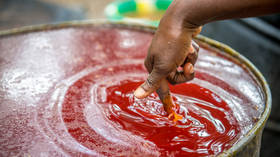Producer stands up for most hated fat source

Malaysia’s commodities ministry said on Thursday the nation plans to adopt an “attacking and aggressive” approach to marketing its palm oil, a vital commodity for the national economy.
The announcement comes as the world's most consumed and controversial edible oil is strongly criticized in the West.
Zuraida Kamaruddin, who oversees Malaysia's plantation industries and commodities, told reporters that the country needs to play up the positives of palm oil and push back against pressure groups in the United States and Europe, while targeting new markets.
“All the benefits are proven by various scientists, but not publicized enough,” she said, as quoted by Nikkei Asia. “Some politicians in the [European Union] are still uninformed and choose not to be informed. We have to look at unconventional ways to promote palm oil.”
Zuraida added that Malaysia should also be “attacking” untapped economies in the Middle East and Central Asia, for example, to sell them palm oil.
Palm oil is one of Malaysia's top exports, with sales reaching their highest-ever monthly value of RM7.91 billion ($1.8 billion) in November 2021, according to the national trade promotion agency.
Last year, Malaysia's producers turned out 18.1 million tons of crude palm oil. Together, Indonesia and Malaysia account for about 87% of global palm oil exports.
Malaysia’s palm oil council said this month it will focus on strengthening its market position regionally, while boosting the fight against negative consumer perception and anti-palm policies, which have damaged the demand outlook in the EU, UK and US.
The country's former Prime Minister Mahathir Mohamad told Nikkei Asia earlier that the product’s criticism was “not so much because palm oil is dangerous to health, but more because of the competition in the edible oil business.”
Kuala Lumpur has allocated RM20 million ($4.7 million) to counter anti-palm oil campaigns in its 2022 budget, Argus media reports.
The anti-palm sentiment has been growing amongst consumers because – of all the cooking oils – it is typically considered the most controversial for both health and environmental reasons. The widely produced tropical oil has been dubbed the world’s most hated crop partly because of its association with deforestation in Southeast Asia. The world uses more palm oil than any other vegetable oil.
For more stories on economy & finance visit RT's business section












